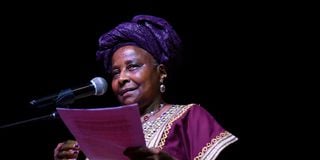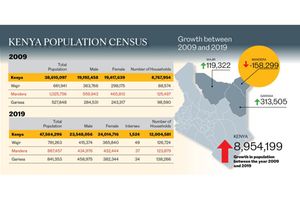Happening now: Mlolongo Three: IG Kanja, DCI boss Amin expected in court
Micere’s search from Marxism through orature and ubuntu

Prof Micere Mugo Githae delivering her speech after receiving Munir Mazrui 2022 Lifetime Award at Kenya National Theatre on January 6, 2023.
I have a glut of personal memories and recollections of Micere Githae Mugo, the literary icon who passed away just over a week ago. But I would like to share only one impression about her.
Micere Mugo was a woman of such strong convictions that she chose to suffer practically all her life because of what she believed.
I say “chose” deliberately because, from what I could gather from her background, and the trends of the early decades of Kenya’s independence, Micere Mugo did not have to undergo the terrors, indignities and tribulations that she did.
Indeed, if she had wished, she could have lived a life of glamour, leisure, affluence and tranquillity in her beloved Kenya. You see, unlike her dear friend and close comrade, Ngugi wa Thiong’o, Micere did not come from “the lowest of the low”, the dispossessed wretched of the earth, left destitute by British colonialism in their own country.
Although the almost accidental meritocracy of British colonial education enabled people like Micere Mugo and Ngugi wa Thiong’o to meet and study together at institutions like Makerere, the social differences of their origins could not be easily erased or ignored.
Micere came from a background that you would describe as “genteel”, with both her parents being teachers in the pre-independence system.
These people, and other professionals, transformed rapidly into a well-heeled, prosperous middle class, especially if they had the right political connections.
Micere Mugo, with her brilliance and excellent education, also had the connections when she embarked on her academic career at UoN in the mid-1970s.
When I first met her in those years, her sister was Chief Nursing Officer, a post of enormous power and influence, and her brother-in-law was Permanent Secretary in the President’s Office.
What more could an ambitious young woman wish for on her way to power and prominence? Yet things began to change drastically for Micere Mugo, especially as she interacted closely with revolutionary-minded intellectuals like Ngugi wa Thiong’o, Alamin Mazrui and Maina wa Kinyatti. Through their Marxist interpretation of Kenyan history, and her own critical observation of the realities of post-independence Kenya, Micere Mugo embraced the call for revolutionary transformation with a fiery zeal.
But what is it that Micere Mugo wanted? What compelled her to turn her back on the luxuries and opportunities literally at her fingertips and emphatically go down the patently dangerous path of revolutionary agitation?
Apparently, she was not looking for political power, either for herself or for her immediate associates. My conjecture is that she was mainly driven by her fierce sense of justice, an all-consuming desire to see fair play in the system, especially for the people who had fought for freedom.
What Micere Mugo, Ngugi wa Thiong’o, Grant Kamenju, Maina wa Kinyatti and their intellectual generation felt, and told us as they taught us, was that the freedom struggle in Africa had been either betrayed or hijacked by selfish cliques and their neo-colonial supporters.
A passage in Achebe’s A Man of the People the narrator says that during the liberation struggle all of us were struggling outside our African edifice, banging on the door to force the colonisers out? But when the colonists got out, a few lucky or cunning ones of us got in and shut the door again.
Now when we bang on the door, they tell us not to hit so hard, or we will bring the house down.
That is how Micere Mugo and her comrades were beginning to see the neo-colonial African state and the “lie” of its uhuru.
It benefited only a few powerful and greedy ones, disadvantaging and disenfranchising the majority of its citizens, the “workers and peasants”, who had spearheaded the liberation struggle. If rectifying the injustice meant dismantling the structure, Micere Mugo and her colleagues were ready to mobilise for that.
Anyway, their activism provoked the fury and the terror that descended on them, especially in the late 1970s and early 1980s. I have the impression that Micere Mugo was singled out for special harassment for a number of reasons.
First, she was regarded as a traitor to her relatively privileged class. Secondly, she was arguably the most articulate, most eloquent and most persuasive among the revolutionaries. It was practically impossible to listen to Micere Mugo without falling under her spell.
Finally, Micere Mugo was a woman, and our chauvinistic patriarchal society fears and hates a “stubborn, noisy” (read assertive) woman.
I have told you of my differences with Micere Mugo and her comrades, even when I was their student and junior colleague.
I particularly doubted the applicability of Soviet-style Marxism or Chinese Maoism, which had developed in specific social and historical contexts, to the contemporary African context. I suppose history has come a long way towards settling this matter among us.
What I realise now, however, and with a lot of respect to Micere Mugo and her colleagues, is that Marxism and other such ideologies were not positions of “arrival” in a simple search for political solutions.
Rather, they were stages in their relentless, agonised search for a viable self-definition and operation of African persons, societies and cultures in the aftermath of the colonial trauma. It is that search that has led our intellectuals to projects like Ngugi’s decolonisation of the mind, and Micere Mugo’s adoption of the ubuntu/utu philosophy, of which she spoke to us with her usual irresistible eloquence earlier this year.
The great favour that Micere Mugo did me and my departed teacher, Pio Zirimu, is beautifully expressed by Professor Wandia Njoya of Daystar University, observing that she was the main promoter of oracy and orature.
“She popularised the term ‘orature’” writes Prof Njoya, “which combined the literary art with oral performance. In almost every lecture Prof Mugo gave, she included orature, which entailed performing one of her poems and inviting the audience to repeat the refrain that was part of the poem.”
I had thought that I was the only one who knew.
- Prof Bukenya is a leading East African scholar of English and [email protected]





